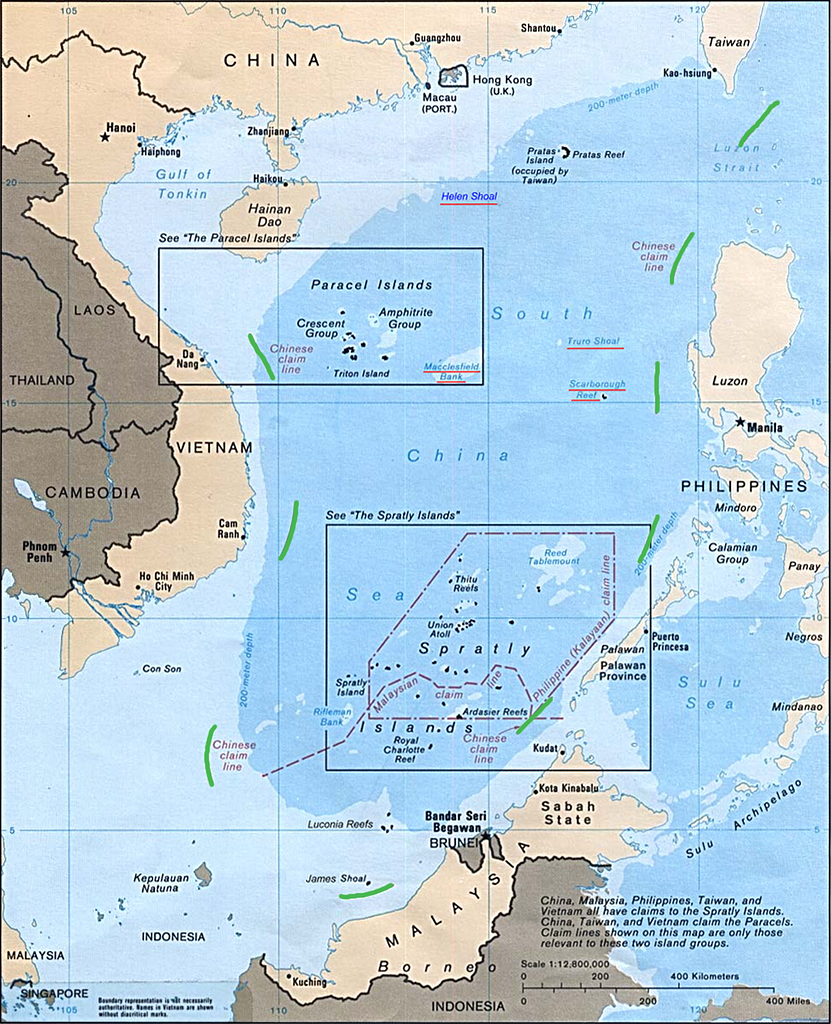The South China Sea Dispute
The five fundamental principles emphasized in Chinese foreign policy are mutual respect for sovereignty, non-aggression, non-interference in internal affairs, equality, and peaceful coexistence. From China’s perspective, the implementation of these principles might seem straightforward, particularly in distant regions such as the Middle East, Africa, and Latin America or regions where China does not seek to intervene. However, there is skepticism regarding the extent of its adherence to these principles, especially developments in nearby regions that could impact its own interests such as the South China Sea. The sea experiences international disputes due to its significant strategic and economic importance.
Significance of South China Sea
Geographical location and crucial position in maritime trade routes make the South China Sea a significant center for global commerce. Furthermore, the rich natural resources in the region, particularly oil, natural gas, and other marine products, contribute to making it a strategic economic zone.
The South China Sea stands as a vital thoroughfare for maritime traffic, holding a pivotal role in global trade. According to the United Nations Conference on Trade and Development (UNCTAD), around 80% of the world’s trade in terms of volume and 70% in terms of value is conducted through maritime transportation. In this volume, 60% of maritime trade flows through Asia, and the South China Sea is responsible for approximately one-third of global shipping.
Since the South China Sea connects Pacific Ocean with Indian Ocean, it is an important transit area. It provides a vital passage for ships traveling to and from some of the world’s largest economies, including China, Japan, South Korea, and Southeast Asian countries. While over 64 percent of China’s maritime trade transited the waterway, nearly 42 percent of Japan’s maritime trade passed through the South China Sea.
The South China Sea is believed to encompass substantial energy reserves, with the U.S. Energy Information Agency estimating approximately 190 trillion cubic feet of natural gas and 11 billion barrels of oil in proved and probable reserves. and other hydrocarbon reserves.
Furthermore, the region’s ecological significance is underscored by its rich biodiversity, encompassing nearly one-third of the world’s entire biodiversity. Over 15 percent of the world’s fisheries are estimated to be located in this area.
International Dispute
China proposed the “Nine Dash Line” map, declaring the South China Sea as China’s ancestral property and claiming control over more than 80 percent of the sea. China’s claim is entirely inconsistent with the concept of the territorial sea limit set at 12 nautical miles. Furthermore, China has increased size of some islands in the South China Sea by depositing sand, built ports and military bases on some islands, and also installed missile and radar systems on certain islands.
China’s sweeping territorial claims in the South China Sea have escalated tensions in that region. In reaction to China’s actions, Southeast Asian nations like Indonesia, Malaysia, the Philippines, and Vietnam have rejected Beijing’s nine-dash line assertions and invoked international law in their defense.
In January 2013, the Philippines initiated arbitration proceedings against China, addressing a dispute related to their respective “maritime entitlements” and the legality of Chinese activities in the South China Sea. The Permanent Court of Arbitration at The Hague, Nederland determined that significant aspects of China’s claim, such as its nine-dash line, recent land reclamation activities, and other actions in Philippine waters, were largely unlawful in July 2016. On the other hand, in response to this decision, China expresses its preference not to recognize the authority of the court.
Also, regional countries are trying to establish strategic partnerships with Western nations and their allies, including the United States and Japan. They aim to seek to strengthen their position in the region. Under these circumstances, a historic meeting took place between Vietnam and the U.S. on September 10, 2023. The summit marked the beginning of a new phase in bilateral relations, elevating the partnership to a Comprehensive Strategic Partnership. The Partnership sets a new stage for the Asia region. Vietnam had similarly elevated its relations with Japan in November 2023.
European countries are also increasing their engagement in the region. On January 11, 2024, the German Foreign Minister visited the Philippines. Minister Baerbock’s trip represents a significant diplomatic event, being the first visit by a German foreign minister to the country in over a decade. She expressed the concerns of European countries regarding China’s activities in the South China Sea, emphasizing that these actions violate the rights of Asian coastal states and threaten freedom of navigation.
In reaction to Minister Baerbock’s visit, China’s embassy in Manila, Philippine issued a statement, asserting that non-regional countries have no right to interfere in the maritime disputes between China and the Philippines. This indicates China’s consistent position of considering the South China Sea entirely as a regional dispute.
The actions taken by the Western bloc are prompting China to formulate new strategies. China is seeking to reestablish connections with regional countries in response to the increasing influence of the United States. In December 2023, Chinese President visited to Vietnam, marking the first visit by the Chinese leader to the neighboring country in six years. Additionally, China’s Assistant Foreign Minister and Philippines Foreign Ministry Undersecretary convened on January 18th, 2024. However, despite all these dialogue initiatives, China seems likely to continue taking steps while prioritizing its own economic and military strength.
Conclusion
The South China Sea holds significant economic and strategic importance. Western bloc and regional countries argue that China’s actions in the region contradict its own foreign policy principles, the sovereignty claims of regional countries, and international law. Nevertheless, China maintains an unwavering commitment to achieving comprehensive and superior control in the region.
The activities and approaches China has undertaken in the region indicate a reluctance to easily relinquish its own sovereignty claims. Even though it attempts to re-establish relations with regional countries, these efforts are assessed by analysts to be far from resolving the issue and remain weak maneuvers.

